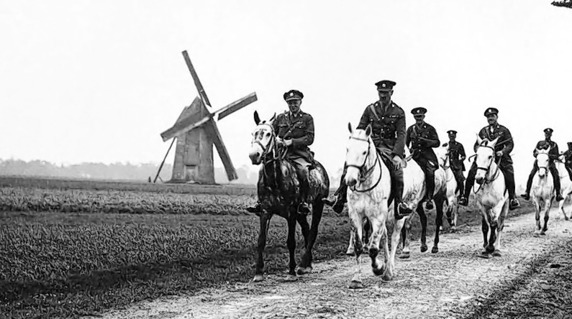God and war
This summer we will rightly remember the outbreak of the First World War.

My grandfather, a Dorset farmer, served in the cavalry during this war. He died when I was very young and my clearest memory of him was his persistent cough that plagued him in his armchair. Only later did I understand the cough to be a permanent effect of mustard gas encountered 60 years earlier on the battlefield. The Great War, as it is known, left 16 million dead and 20 million wounded. It is right to remember such tragic but important events.
Bloodiest war?
But myths also creep into the memories. For example, the claim that it was the bloodiest war in history up to that time is false. In the previous century, 30 million died in a war in southern China that lasted 14 years. Historian Dan Snow points out that as a proportion of the population more were killed in the English Civil War (1642–1651) than in the Great War.
Another common myth that clouds any discussion of war is the lazy charge that religion is the cause. Of course, the claim that religion is a cause of war may sometimes be true. But rarely is religion an important cause. An academic study of war identifies 1,763 wars that have been waged in human history. Of that number, 123 can be categorised as religious in nature, with more than half of those motivated by Islam. In fact, thoughtful Christians have always been critical of the very concept of war.
In the early church, many Christians were pacifists. Given that Jesus told us to ‘turn the other cheek’, it must have seemed natural to avoid being caught up in the cycle of violence that has marked world history. Early church leader Tertullian (160-220) wrote: ‘Only without the sword can the Christian wage war: for the Lord has abolished the sword’.
The just war?
As Christianity came to occupy a place in government through Roman Emperor Constantine’s conversion, theologians reflected on what came to be known as the ‘just war’ theory. Augustine (354–430) argued that it was permissible for Christians to serve in the army. But he also explained that only some wars were justified: ‘the wise man will wage just wars … if they were not just he would not wage them’. (The City of God). Thomas Aquinas (1225–1274) wrote the most influential explanation of just war theory. Firstly, such a war should be authorised by the state (Romans 13:4), secondly it thirdly should have a good cause and it should aim to bring peace. In further reflection on war, Christians argued that civilian casualties should be avoided and that the ends do not justify the means in any conflict.
Through reflections like this, Christians have generally accepted war as a sad necessity in a fallen world. There have always been dissenting pacifist voices, like the Anabaptists and some Brethren movements. But other Christians have served in the armed forces with distinction; after all Jesus said blessed are the ‘peace makers’ not blessed are the ‘peace lovers’. Making peace demands that evil be confronted and defeated.
The causes of war
So what causes war? The Bible gets to the heart of the issue: ‘What causes fights and quarrels among you? Don’t they come from your desires that battle within you?’ (James 4:1). Sometimes religion or atheism may be a motivating factor, but there is also ethnic tension, poverty, fear and what the Bible simply calls ‘sin’. However, justice and love might also motivate war, as wrongs need to be righted and evil confronted. God himself is the ultimate peacemaker. The peace that was broken by the rebellion of Adam and Eve would be restored through the peace-making of Calvary (Colossians 1:20). Along the way, God confronted wickedness with judgment in the Flood, the destruction of the cities of Sodom and Jericho and even the fall of Jerusalem. God is a mighty warrior (Jeremiah 20:11). When the Bible describes a final conflict before the end of this age, the leader of God’s armies is none other than Jesus Christ (Revelation 19:11). That will be the war to end all wars.



